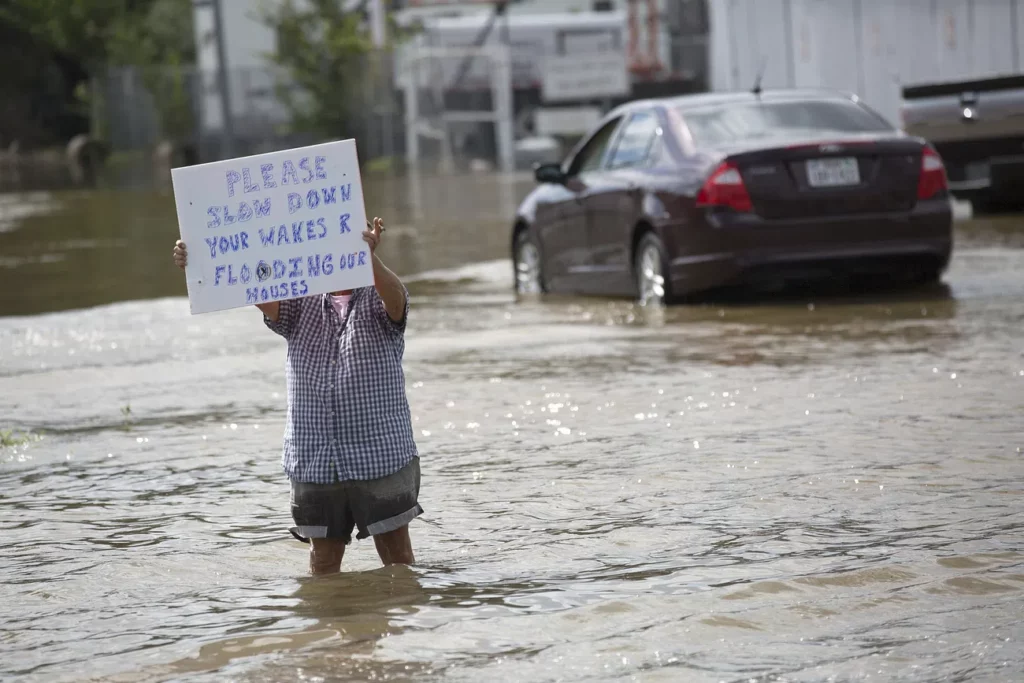How ‘risk tipping points’ threaten humanity’s ability to cope with climate crisis
By Damian Carrington | October 26, 2023
 A resident holds a sign asking passing drivers to slow down to reduce wakes that exacerbate flooding in a suburb of Houston, Texas, in the aftermath of Hurricane Harvey in 2017. (U.S. Customs and Border Protection photo by Glenn Fawcett)
A resident holds a sign asking passing drivers to slow down to reduce wakes that exacerbate flooding in a suburb of Houston, Texas, in the aftermath of Hurricane Harvey in 2017. (U.S. Customs and Border Protection photo by Glenn Fawcett)
Editor’s note: This story was originally published by The Guardian. It appears here as part of the Climate Desk collaboration.
Humanity is moving dangerously close to irreversible tipping points that would drastically damage our ability to cope with disasters, UN researchers have warned, including the withdrawal of home insurance from flood-hit areas and the drying up of the groundwater that is vital for ensuring food supplies.
These “risk tipping points” also include the loss of the mountain glaciers that are essential for water supplies in many parts of the world and accumulating space debris knocking out satellites that provide early warnings of extreme weather.
A new report from the UN University (UNU) in Germany has set out a series of risk tipping points that are approaching, but said having foresight of these meant that it remained possible to take action to prevent them. Tipping points are triggered by small increases in their driving force but rapidly lead to large impacts.
The risk tipping points are different from the climate tipping points the world is on the brink of, including the collapse of Amazon rainforest and the shutdown of a key Atlantic Ocean current. The climate tipping points are large-scale changes driven by human-caused global heating, while the risk tipping points are more directly connected to people’s lives via complex social and ecological systems.
“As we indiscriminately extract our water resources, damage nature, and pollute both Earth and space, we are moving dangerously close to the brink of multiple risk tipping points that could destroy the very systems that our life depends on,” said Dr Zita Sebesvari, at UNU’s Institute for Environment and Human Security. “We are changing the entire risk landscape and losing our tools to manage risk.”
The report examines six examples of risk tipping points, including the point when building insurance becomes unavailable or unaffordable. This leaves people without an economic safety net when disasters strike, compounding their difficulties, particularly for the poor and vulnerable.
The climate crisis is increasing the frequency and severity of extreme weather and, for example, a major insurer has already stopped insuring properties in California, due to “rapidly growing catastrophe exposure”, particularly wildfires. Insurance premiums have also soared in Florida, and six insurers in the state have gone bust due to climate-related floods and hurricanes. The report also said half a million Australian homes are estimated to be uninsurable by 2030, primarily due to increasing flood risk.
Another risk tipping point examined in the report is when groundwater aquifers are overexploited to the point that the wells run dry. Aquifers currently prevent half the losses to food production caused by droughts, which are expected to become more frequent due to global heating, the report said.
More than half of the world’s major aquifers are already being depleted faster than they can be naturally refilled, the report said. If they suddenly dry up, entire food production systems are at risk of failure.
The groundwater risk tipping point has already been passed in some countries, such as Saudi Arabia, and is close in India, the report said. Saudi Arabia was a major wheat exporter in the 1990s but now imports the cereal after the groundwater wells were exhausted.
The other risk tipping points covered by the report were the point when water supplies from melting mountain glaciers start to decline; when Earth’s orbit becomes so full of debris that one collision with a satellite sets off a chain reaction; when heatwaves pass the point when natural sweating can cool the human body; and when losses of interdependent wildlife species snowball into the collapse of an ecosystem.
“You might not know [about risk tipping points] now, but you will,” said Caitlyn Eberle, also at UNU. “In five years, 10 years, 20 years, they will be there. But we do not have to suffer these impacts, they are really in our power to change.”
“Real transformative change involves everyone,” said Sebesvari. In the case of home insurance, for example, owners can increase flood resilience, municipalities can improve planning, governments can offer state-backed insurance and global action from countries and companies can cut carbon emissions.
Sebesvari said values need to change too: “One of our examples is “being a good ancestor”, which sounds flowery but we think the rights of future generations should be very concretely built into decision making processes.” She said a practical demonstration of this would be using lower discount rates when making decisions based on the future benefits of investments.
Prof Tim Lenton, at the University of Exeter, UK, said: “These authors are using a different definition of a tipping point to the one I have been popularising, which emphasises strong reinforcing feedback.”
“Much of what they describe are threshold responses, which certainly pose important risks – especially human exposure to extreme heat and humidity which as we saw in the tragic Asian heatwave earlier this year, can be fatal,” he said. “One could call that a true tipping point at the level of the individual when our natural self-regulation of temperature by evaporating sweat fails us.”

Together, we make the world safer.
The Bulletin elevates expert voices above the noise. But as an independent nonprofit organization, our operations depend on the support of readers like you. Help us continue to deliver quality journalism that holds leaders accountable. Your support of our work at any level is important. In return, we promise our coverage will be understandable, influential, vigilant, solution-oriented, and fair-minded. Together we can make a difference.
Keywords: climate crisis, climate disaster, disaster preparedness, flood, insurance, tipping points, water, wildfire
Topics: Climate Change















